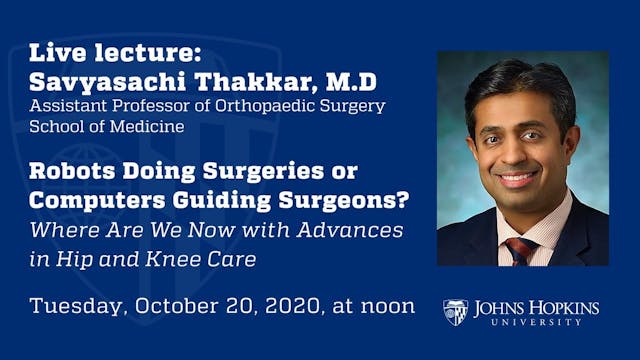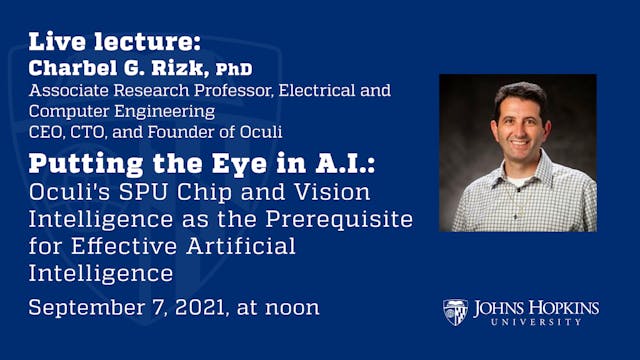Space for All – Opening Spaceflight to People with Disabilities
Science, Engineering, & Technology
•
1h 56m
Hopkins at Home and Bioastronautics @ Hopkins, introduced and moderated by Dr. Mark Shelhamer (Director of the JHU Human Spaceflight Lab). This session will focus on making space travel inclusive for people with disabilities and features Dr. Sheyna Gifford, Sarah Hasnain, and Dr. Bonnielin Swenor and includes a live Q&A session moderated by Dr. Mallika Sarma.
Dr. Gifford is an associate professor of Orthopedics and the rehabilitation physician for St. Louis University. She is board certified in rehabilitation medication, a senior Aeromedical Examiner for the FAA, and the head of Medical Operations for Astroaccess, a mission to expand inclusion and disability representation on Earth and in space.
Sarah Hasnain is an Engineer, Innovation Program Coordinator, and Founder & Lead of the Human Spaceflight Innovation Network at The Johns Hopkins University Applied Physics Laboratory. Their work is rooted in impactful solutions to critical challenges on Earth and in Space: Systems Integrator for autonomy and dust mitigation via the Lunar Surface Innovation Consortium (LSIC); Project Manager and Lead Inventor of a patent-pending Pulsar-based Autonomous Navigation (XNAV) toolkit; Software Engineer in the Science Operations Center (SOC) for the Dragonfly Mission exploring Titan’s surface and the Double Asteroid Redirection Test (DART) – NASA’s first planetary defense mission. Hasnain’s interests include Space-Earth translational innovation, (analog) astronautics, disability-centered human factors, AI Ethics, and sociotechnical impacts.
Dr. Swenor is the founder and director of the Johns Hopkins Disability Health Research Center, which aims to shift the paradigm from “living with disability” to “thriving with a disability” through research, education and policy. Dr. Swenor’s research is motivated by her personal experience with low vision and focuses on three overlapping areas: removing barriers to health and economic wellbeing for people with disabilities, addressing health care disparities for the disability community; and ensuring people with disabilities have equitable access to education and are included in research. Dr. Swenor, associate professor at the Johns Hopkins School of Nursing, holds joint appointments at the School of Medicine’s Wilmer Eye Institute and in the Department of Epidemiology at the Bloomberg School of Public Health.
Up Next in Science, Engineering, & Technology
-
Showcase Series: The Future of Artifi...
Brought to you by Hopkins at Home and the Office of Government, Community and Economic Partnerships.
Alexis Battle
Director, Malone Center for Engineering in Healthcare; Associate Professor of Biomedical Engineering and Computer Science.
Alexis Battle is an associate professor in biomedical en... -
Robots Doing Surgeries or Computers G...
There are several advances in the non-operative and operative care of patients with hip and knee problems. Technical and technological innovations have provided a cutting-edge to patients and providers alike. Savyasachi “Savya” Thakkar, M.D., Assistant Professor of Orthopaedic Surgery, leads a di...
-
Putting the Eye in A.I.
Charbel G. Rizk, Associate Research Professor at the Whiting School of Engineering, is revolutionizing the way machines see. As Founder and CEO of Oculi® - a deep tech startup – his team developed the OCULI SPU™ (Sensing and Processing Unit), a complete vision system on a single chip. Where trad...



